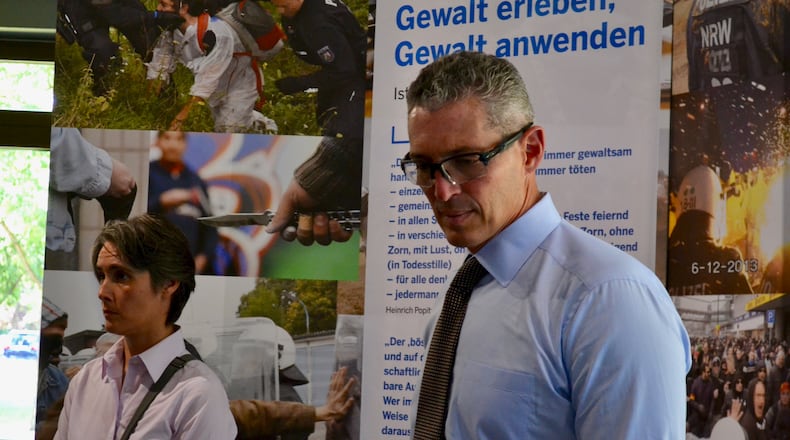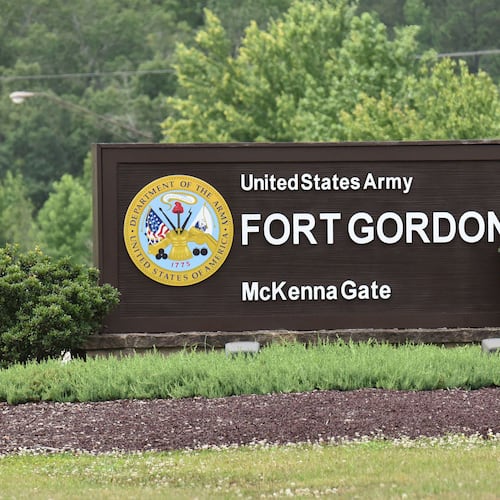Atlanta Deputy Police Chief Andrew Senzer stood on the grassy shoulder of a concrete field, the remnant of a former World War II military ammunition depot near Dortmund in northwestern Germany. Tall, trim, dressed in a polo shirt and cargo pants, he watched as police officers in heavy black riot gear calmly approached a bus packed with rowdy soccer fans.
Senzer, who leads field operations for the Atlanta Police Department, was observing an exercise involving about 200 riot police officers from North Rhine-Westphalia, Germany’s largest state. He said the Atlanta department doesn’t have the infrastructure to match European countries’ massive crowd control operations.
“I look at this with some envy,” he said.
Senzer was part of a delegation that recently visited Germany to exchange ideas about policing practices, training and leadership.
Credit: Katja Ridderbusch
Credit: Katja Ridderbusch
German police deal with mass disorder regularly, from riots erupting over soccer matches or during demonstrations. Atlanta has experienced demonstrations, at times leading to unrest, and is preparing for large gatherings in the future.
“We have a series of big events coming to the city,” Senzer said.
Atlanta is a finalist for the 2024 Democratic National Convention. It will host the 2025 College Football Playoff National Championship and is a host city for the soccer World Cup in 2026. Law enforcement officials expect the World Cup to draw thousands of fans.
“We need to make sure that we have a contingency of officers heavily trained and prepared,” Senzer said.
The small delegation, which also included members of the Atlanta Police Foundation, was hosted by the German Police University in Münster. The visit was organized by GILEE, Georgia State University’s award-winning international law enforcement leadership program, which marked its 30th anniversary this past year.
It was GILEE’s first trip to Germany. “This was an exploratory mission,” said Robert “Robbie” Friedmann, a criminal justice professor at GSU and GILEE’s founding director.
For decades, GILEE has offered exchange programs for senior police officers from the U.S., Israel, the U.K., the Bahamas and Hungary. The program in Germany included strategic, academic, tactical and operational elements. Lectures and field trips identified differences and commonalities in policing in both countries.
Credit: Katja Ridderbusch
Credit: Katja Ridderbusch
“American law enforcement is hyper-decentralized,” according to Maria Haberfeld, a professor of police science at John Jay College of Criminal Justice in New York City.
The U.S. has approximately 800,000 officers working at 18,000 federal, state and local law enforcement agencies. In Germany, 310,000 officers serve on 18 police forces, 16 operating under the same jurisdiction and two federal police agencies.
One big difference between policing in the U.S. and Germany stems from the high prevalence of gun violence in America. In Atlanta alone, police investigated 160 homicide cases in 2021, compared to 43 in Germany, according to the Federal Criminal Police Office.
“The danger for the individual police officer to be assaulted, even killed, on any given shift – especially with firearms – is much higher in the U.S. than it is in Germany,” said Uwe Marquardt, deputy police commissioner and vice president of the German Police University.
Credit: Katja Ridderbusch
Credit: Katja Ridderbusch
Realities in different countries inform different policing strategies, styles, training and equipment, said Haberfeld. One of the most common threats to public safety in Germany is civil unrest. In Germany, police are required to spend at least one year with a riot unit.
On a recent morning, with the sun hanging low and bright over the tarmac, about 200 officers trained at the former military depot. In the exercise, officers set up a cordon around a bus filled with colleagues acting as soccer fans. Officers ran ID cards and pulled known troublemakers, then escorted groups of fans to the stadium. With the help of drone images and other technology, police were able to spot agitators in the crowd and make targeted arrests.
Senzer found it interesting that crowd control in Germany is “a scalable model. There’s de-escalation built in. There’s time. There’s patience. I like that a lot,” he said.
At the Atlanta Police Department, crowd control is a secondary assignment for officers, who have other day-to-day duties, usually patrol. Atlanta police’s Civil Disturbance Unit (CDU) has about 60 officers. They train quarterly and are pulled from field operations when needed.
Credit: Katja Ridderbusch
Credit: Katja Ridderbusch
Senzer plans to be in close touch with his German colleagues and to rely on them to be “subject matter experts” as Atlanta gears up for the coming events.
Aside from tactical elements, Germany, and most European police forces, go through longer and more academically centered training than U.S. police. Almost every police officer in Germany must complete a three-year bachelor’s program at a state police academy, which offers a mix of classroom lectures, practical exercise and field training.
Most U.S. law enforcement agencies require a high school degree for officers. The average police academy is 17 weeks, followed by several months of field training alongside an experienced officer.
“Training for police in the U.S. is the shortest in any democratic country,” said Haberfeld.
After earning a bachelor’s degree, German police officers must work patrol and serve in a riot unit before they can apply for specialized assignment like criminal investigations or drug trafficking. To move into leadership ranks, officers must complete a two-year master’s program at the German Police University.
“The idea is that practical experience and theoretical education will blend and produce a well-rounded senior police officer,” Marquardt said.
The Atlanta delegation had mixed reactions to the German model of police education. Friedmann thought that “putting such a strong focus on higher education is where Germany can provide some inspiration to U.S. law enforcement.”
It would be unthinkable to hire a nurse, or a social worker, or a teacher without a professional degree, he added. “How does the American society allow police officers who are tasked with so many responsibilities and expectations not to have a higher education degree?”
A strong focus on higher education “certainly makes you a smarter police officer,” said Major Fred Watson, the director of Atlanta Police Department’s Training Academy and a member of the delegation. “But it doesn’t necessarily make you a better cop in the field.”
Credit: Katja Ridderbusch
Credit: Katja Ridderbusch
Kenneth DeSimone, chief of the Sandy Springs Police Department, who also participated in the trip, said American law enforcement training also has unique strengths, as it creates a force with broader and more diversified skills.
Still, setting a high standard for education seems to help German police with an issue that law enforcement in the U.S. has been struggling with for the past two years – recruitment and retention. The Atlanta police department, for example, is still 450 officers shy of its authorized strength of more than 2,000 cops.
The state of North Rhine-Westphalia, with a force of 50,000, currently hires 3,000 new police officers every year out of 10,000 applicants. “Becoming a police officer in Germany means, by and large, that you are employed for life,” said Marquardt. “Also, the pay is good, as is the pension.”
This year, the German delegation from Münster will come to Atlanta.
Reflecting on the week spent with his German colleagues, Senzer said that it’s always valuable to break away from the familiar, broaden the perspective and see how other police forces are working. “It makes you grow as a profession, and it makes you grow as a leader.”
Katja Ridderbusch is an Atlanta-based journalist who reports for news organizations in the U.S. and her native Germany. Her stories have appeared in U.S. News & World Report, Time, USA Today, Kaiser Health News and several NPR affiliates.
About the Author
Keep Reading
The Latest
Featured







